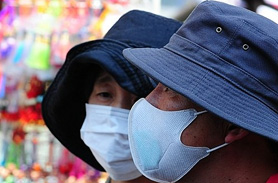 영어토론방 영어토론방 | Home>영어토론방 |
Society Fears of New Flu Spread in S. Korea
페이지 정보

본문
 1. Fears of New Flu Spread in S. Korea
1. Fears of New Flu Spread in S. Korea As the number of people infected with Influenza A has surpassed 3,000 in South Korea, more schools have postponed the beginning of post-vacation school and decided to close school for the time being amid mounting fears.
President Lee Myung-bak Monday called for all-out efforts to increase the supply of drugs to treat the contagious diseases after a recommendation from health authorities that the country needs to double its stock.
"After receiving a report that the new flu could rapidly spread in October or November, the president said the government must make its utmost effort to secure a sufficient supply of treatment drugs, including Tamiflu," Cheong Wa Dae spokesman Lee Dong-kwan was quoted as telling a press briefing after a meeting of secretaries.
As of Monday, more than 3,000 South Koreans have been diagnosed with the new flu since it was first reported here in May. About 1,000 patients are currently being treated at hospitals or in their homes.
Seoul currently has enough Tamiflu to inoculate some 5.31 million people, about 10 percent of the country's total population. Health officials reported Monday the country will need to secure enough for 20 percent of the population.
"This means the government will inject emergency funds if necessary to secure the required drugs," the spokesman said
 2. Flu Epidemic May Punch a Big Hole in Economy
2. Flu Epidemic May Punch a Big Hole in Economy Kim Ji-soo, a Woori Bank teller in central Seoul, searches online for information related to the H1N1 flu at least four to five times a day. The 24-year-old spends her days handling bills that have changed hands countless times, and wants to be sure to check any and every unusual development in her body.
Admitting her paranoia, Kim says it doesn't hurt to be fully aware of which symptoms to look out for.
"It takes me about 10 minutes to quickly skim through the latest articles and discussion threads regarding the Influenza A virus," said the worker, who typically reports to her office around 8 a.m. and leaves at 7 p.m.
She spends roughly 40 to 50 minutes per day surfing the Web for health-related updates, but no matter the reason, the extra time spent online is likely to annoy any fussy boss.
But it's not just Kim ramping up her Web surfing frequency, as a new report showed Tuesday that the recent deaths caused by the flu and rapidly soaring number of infected patients have jacked up search frequencies of terms related to the H1N1 virus.
Overture Korea, the country's No. 1 Internet keyword ad agency, said the number of search words linked to the highly-contagious illness has spiked up 1,355 percent in one week after Aug. 15, when South Korea confirmed its first fatality from Influenza A.
Since then, keywords associated with H1N1 prevention were also increasingly searched, with terms such as Tamiflu, antibacterial hand gel and mask being searched 703 percent more often during the same period.
``Paranoia and fear are gripping South Koreans,'' said Jung Yu-hoon, an economist at Hyundai Economic Research Institute (HERI), who explained that such unrest will ultimately lead to higher economic and social costs due to the pandemic.
The economic think tank forecasts that in the worst case scenario, the fast-spreading influenza can drag down 7.8 percent of South Korea's gross domestic product (GDP) and push down fresh labor demand by 1.01 million people.
The worst is avoidable as long as the government takes appropriate and timely measures, HERI says, but even a mild impact has the potential to hurt the country's economic growth and labor market.
And recent events show why the illness can be so damaging to the country socially and economically.
Two weeks ago, the 63 Building in Yeouido, western Seoul, had to discontinue operating elevators above the 15th floor after one employee working for a foreign securities firm situated on the 15th to 17th floors tested H1N1 positive.
The fiasco forced the company to temporarily close for days and had all of its employees undergo a virus examination.
``Lack of productivity is just a small part of the flu's economic impact," said Kim Im-kwon, an analyst at Hyundai Securities.
Mexico, where the influenza virus first surfaced, demonstrates how severely a health epidemic can pound a nation's economy. According to latest figures, Mexico's economy plunged a record 10.3 percent in the second quarter, largely due to the steady decline of inbound tourism, the country's third-largest source of revenue, since the outbreak of the flu.
Kim said South Korea may witness an overall drop in consumer confidence and other ripple effects resulting from the flu scare if the government fails to put a cap on the spread of the virus.
jhan@koreatimes.co.kr
- paranoia : if someone suffers from paranoia, they are too suspicious and afraid of other people.
- skim : to read through it quickly
- jack up : If you jack up a heavy object such as a car, you raise it off the ground using a jack.
- fatality : the number of person who died from accident.
- epideminc : to affects a very large number of people and spreads quickly to other areas.
- inbound : to arrive from another place.
- ripple effect : to cause several other events to happen one after the other.
Question
1. Do you know new flu(the Influenza A)?
What do you know about it? And tell us other's cognition or reaction.
2. How to be aware of new flue(ex;newspaer, advertisement, television) and How does it affect you?
3. In these days, S. Koera exaggerate new flu's effect and people respond to it too munch.
What do you think about that? Also, give your opinion to solve this problem.
댓글목록
등록된 댓글이 없습니다.

